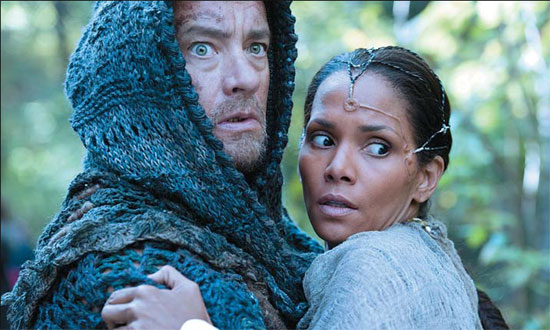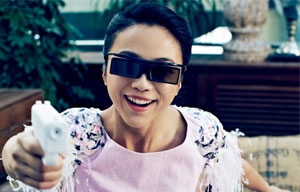

 |
|
Cloud Atlas, starring Tom Hanks and Halle Berry, is accessible to Asian audience with its Buddhist theme. Provided to China Daily |
Cloud Atlas, directed by Lana Wachowski, Andy Wachowski and Tom Tykwer, is not the conventional Hollywood blockbuster Chinese audiences usually see in theaters.
Over two-plus hours, the science-fiction epic ambitiously interweaves six stories from different eras and deliberately makes superstars, such as Tom Hanks and Halle Berry, unrecognizable.
The film has polarized viewers since its release in Europe and the United States. Those who love it enjoy decoding the myth behind the storyline, while dissenters call it incoherent and tedious.
 |
The three directors, however, are confident about the Chinese audience.
"The inter-connectibility of the stories will make your mind the subconscious editor of the story, you will take the liberty to be an editor to find the answer," says Tykwer, director of Run Lola Run and Perfume: The Story of a Murderer.
Tykwer and the Wachowskis, who directed the Matrix series, are all fans of David Mitchell's book which the film is based on. They spent four years turning the interwoven stories into a movie.
The complex material never daunted them, but the actual writing process, as described by Tykwer, is "fairly boring".
What they did was to take every scene in the book, write each one on an index card and put it out on the floor in a house they rented. The cards basically covered all the roles and scenes.
"Then we just sat there and looked at it as if it was a Zen garden," Andy Wachowski says. "Then we began finding all these little tiny threads woven into the book and were able to make sense of it and find connections."
The three directors, calling themselves "modern Three Kingdoms" in reference to the warring Chinese states 2,000 years ago, have no fears about Chinese audience's understanding of the plot, although authorities trimmed it about 30 minutes shorter than the global releases.
"The film deals with the issue of incarnations of Buddhism, which is particularly accessible for Asian audiences," Lana Wachowski says.
Between Buddhism and Western culture's attitudes toward life, she prefers the former.
|
 |
"The immortality of Western culture is located in somewhere else," she says. "There is heaven and hell which has nothing to do with the world. I prefer Buddhism because it always brings you back to this world, in that way it helps you think more about the connection to ancestors and descendants, where you come from and where you are going."
The film is not for lovers of what she calls "McDonald's-style films", but for those who hunger for the emotional and intellectual challenges a movie can bring.
"Cinema art has this weird relationship to satisfaction," she says. "When buying a product in a store, people feel satisfied when it is exactly what they expect. But art is not about expectations, art is about abandonment of expectations, you have to abandon your perspective on the world, you have to surrender to a different point of view, this is how our movie works on you.
"You certainly look at the world differently, and that expands your own mind," Lana Wachowski says.
The film hit Chinese theaters on Jan 30.
liuw@chinadaily.com.cn